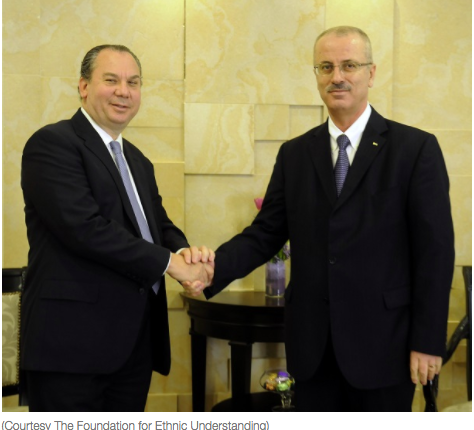
Times of Israel
By Rabbi Marc Schneier
On Wednesday, President Donald Trump announced that the United States will recognize Jerusalem as the capital of Israel and is initiating the process of relocating the U.S. embassy from Tel Aviv. This decision reverses decades of American foreign policy and raises fears of a violent backlash. The final status of Jerusalem has always been one of the most difficult and sensitive questions in the Israeli-Palestinian conflict. Yet, endorsing Israeli Jerusalem does not reject Palestinian claims to the Holy City nor does it preclude a Palestinian state. For that matter, America’s recognition of Jerusalem does not disqualify Jerusalem as the capital of a Palestinian entity.
While meeting with Palestinian prime minister Rami Hamdallah at his office in Ramallah in 2013, I offered the following suggestion to address this heated controversy of Jerusalem as the capital of both Israel and Palestine. I remarked that the name Jerusalem has different meanings and connotations for our two peoples. In Jewish tradition, Jerusalem, meaning “the City of Peace,” is often referenced in the Bible. The name Jerusalem and other appellations – City of David, Mount Moriah and Zion – appear more than 2,000 times in Hebrew scriptures. In the Islamic tradition, the city is referred to by its Arabic name, Al-Quds, meaning “the Holy One.” For example, the Palestinian Arabic language daily newspaper, based in Jerusalem, is known as Al-Quds. Additionally, the only Palestinian university in Jerusalem is known as Al-Quds University. Just yesterday, the Tehran Times in condemning President Trump’s decision said, “President Donald Trump defied overwhelming global opposition by declaring U.S. recognition of al-Quds (Jerusalem) as the capital of Israel and announced plans to relocate the U.S. embassy there.”
So here we have it. The name Jerusalem is an expression of Jewish hopes and Jewish dreams as Al Quds is an expression of Islamic aspirations and beliefs. I respectfully suggest that by focusing our attention on the name of the city, we can find a path to narrow the divide and chasm in our emotional and psychological responses to this controversy. Jerusalem can be the capital for both faiths but let its name reflect our respective traditions and sacred texts. Let Jews refer to the Holy City as Jerusalem and Muslims refer to the Holy City as Al Quds. This conflict is more of an emotional/psychological impasse than a geographical one. This proposal is in concert with President Trump’s declaration recognizing Jerusalem as the capital of Israel while maintaining a commitment to a Palestinian state with the city as its capital.
As I suggested to Palestinian Prime Minister Rami Hamdallah, the conflict over Jerusalem is deeply rooted in its name. As Jews and Muslims, let us return to our respective traditions and express our connectivity to the Holy City as cited in our holy texts. May Jerusalem / Al Quds truly become the City of Peace and the Holy One for Jews, Muslims and all adherents of faith.


Rabbi Marc Schneier is the president and founder of the Foundation for Ethnic Understanding. A trailblazer in the field of Muslim-Jewish relations, Schneier created and spearheaded the annual Weekend of Twinning’s of Mosques and Synagogues across the globe; the annual meetings of the Gathering of European Muslim and Jewish Leaders (GEMJL) in Paris and Brussels; multiple unity missions to the United States by Muslim and Jewish Leaders from around the world; and the first Summit of Rabbis and Imams. Rabbi Schneier and Imam Shamsi Ali are the co-authors of Sons of Abraham: A Candid Conversation about the Issues that Divide and Unite Jews and Muslims.
Copyright © 2025 Foundation For Ethnic Understanding. All rights reserved. | Privacy Policy